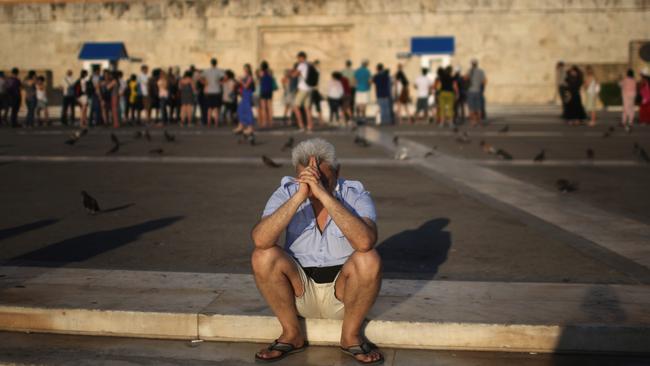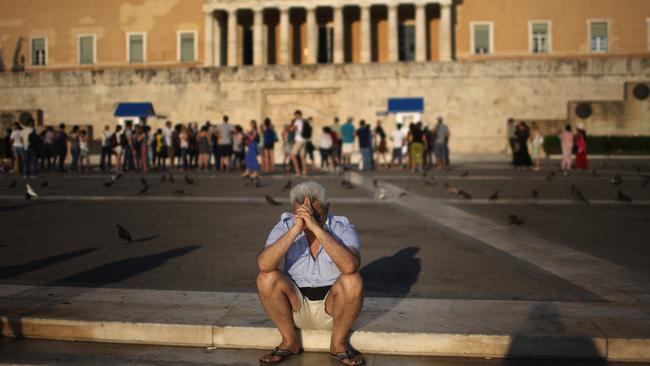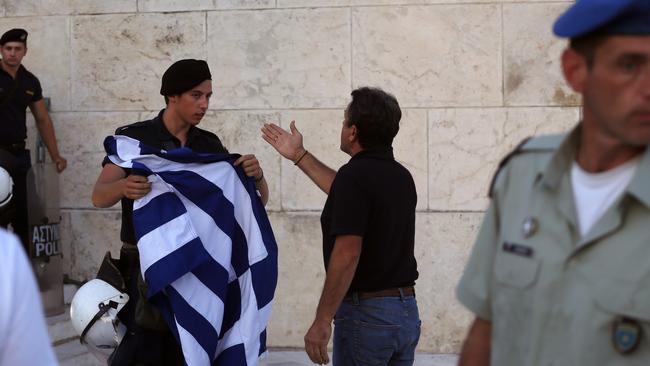Greeks ‘humiliated’ by tough new bailout deal, fear asset sell-off
EUROPEAN leaders might be pleased with themselves, but ordinary Greeks are more frightened than ever.

GREEKS fear the national jewels might be snatched as collateral as part of a tough new bailout deal slammed as “humiliating” by citizens who voted against further austerity measures.
“We avoided an exit from the eurozone,” said sharply-dressed retired businessman Michaelis Sarides, as he sipped a coffee at a bar in central Athens.
“But I warn you, if they take the Acropolis from us, it’s war,” he said darkly.
The outline deal thrashed out between the 19 eurozone nations in strained overnight talks calls for Greece to push through a range of reforms to secure a bailout worth up to 86 billion euros ($96 billion).
Emerging reports reveal how close the talks came to toppling over, with the president of the European Council, Donald Tusk reportedly stopping the Greek prime minister Alexis Tsipras, and one of toughest negotiators German chancellor Angela Merkel, from leaving the talks about 6am on Monday morning when talks seem to have reached a deadlock.
“Sorry, but there is no way you are leaving this room,” Mr Tusk said.
Without a deal, Greece’s economy will collapse and the country could crash out of the eurozone.
But among the key measures Prime Minister Alexis Tsipras will have to rush through parliament is the creation of a controversial debt repayment fund, which aims to raise 50 billion euros ($55 billion) by selling off valuable Greek assets.
“They can’t take a part of the country,” said an aghast Lefteris Paboulidis, who owns a dating service business.
“Has that happened anywhere else so it can happen here? The situation is dramatic.” Like many ordinary Greeks, he was sceptical that the deal would bring about any improvement to their lives.
There were raised voices, reprimands and outright hostility as Eurozone leaders hammered out the new three-year agreement, that will pile billions more debt on top of the 300 billion euro Greece already owes its creditors.
Greek Prime Minister Alexis Tsipras capitulated on his defiance and agreed to push through pension, market and privatisation reforms starting from this week.
The deal requires the Greek parliament to approve a raft of market-oriented laws by Wednesday as a sign of good faith and face scrutiny by the International Monetary Fund (IMF) for compliance.
The last-ditch deal is aimed at keeping Greece’s economy afloat amid fears its cash-starved banks were about to finally run dry and trigger its exit from the single currency.
“Grexit has gone,” European Commission President Jean-Claude Juncker told AFP after the talks, ruling out the threat of a departure from the euro which could have potentially destabilised the global economy.
A weary Tsipras insisted the deal was good for Greece, even though analysts say the terms are in some respects tougher than those Greek voters had rejected on his recommendation in a referendum just one week ago.

“We fought a righteous battle to the end,” Tsipras said.
The deal, Tsipras argued, includes help to ease Greece’s huge burden of debt and revive its crippled banking system.
“The great majority of Greek people will support this effort,” he added.
But Tsipras now faces a tough task selling the deal to the Greek people, parliament and his radical Syriza party, which shot to power in January on the back of promises to end five years of bitter austerity under two previous bailouts.
Greece’s public servants are being called to stage a 24-hour strike for Wednesday, the first since Tsipras took power.
‘MISERY, HUMILIATION AND SLAVERY’
“It would be better not to have a deal than the way it was done because it will certainly be worse for the years to follow,” the 35-year old said.
“I would have preferred something else to happen, such as Grexit, where we would have starved in the beginning but dealt with it ourselves.” Ilias, a 26-year-old civil servant, insisted that “the important thing is for the country to be better off — not so much if we stay in Europe or not, that is the last thing to think of.” “If we stay in Europe and the country goes from bad to worse, I can’t see anything positive about that,” he said.
Haralambos Rouliskos, a 60-year-old economist, described the agreement with Greece’s eurozone partners as “misery, humiliation and slavery”.
His feelings were echoed by Katerina Katsaba, a 52-year-old working for a pharmaceutical company, who said: “I am not in favour of this deal. I know they (the eurozone creditors) are trying to blackmail us.” But despite belief in many quarters that radical left PM Alexis Tsipras has been taken to the cleaners by Europe, she added: “I trust our prime minister — the decisions he will take will be in the best interests of all of us.” Among the measures demanded that would directly affect citizens are lifting a ban on Sunday trading for shops, opening up ownership of pharmacies and opening up closed professions such as ferry transport.
“I think the terms agreed for the bailout are going to make life very hard for all of us. But I agree with the idea of Sunday openings ... it can only help the economy,” said Melina Petropoulou, 41, the manager of a women’s clothes shop.
But in an up-market jewellery store across the street, office manager Gianna Georgakopoulou, 43, protested that “everyone thinks we Greeks are lazy but we work hard. With Sunday gone, when are we supposed to rest?”
HASHTAG HOSTILITY
Others inside the country, and in other EU member states, took to Twitter to express anger at the deal and perceived bullying of Greece by Germany.
A hashtag, #ThisIsACoup, was trending widely in Greece, France, Germany and Britain as they claimed that Greece was effectively being stripped of fiscal sovereignty.
“Germany is destroying Europe once again,” tweeted @KostasKainakis, whose profile says he is a marketing lecturer in Athens.
“The Germans could not do it with tanks so now they try it with banks Trying to STEAL Greek assets BrITS MUST vote to get out,” opined a tweet from Britain by @AllanSkerratt, who said he was a nonpartisan retired soldier and ex-teacher.
Prominent commentators such as Paul Krugman, the Nobel-winning economist who writes for the New York Times, helped propel the term into the mainstream.
Krugman wrote: “The trending hashtag #ThisIsACoup is exactly right. This goes beyond harsh into pure vindictiveness, complete destruction of national sovereignty, and no hope of relief.”




